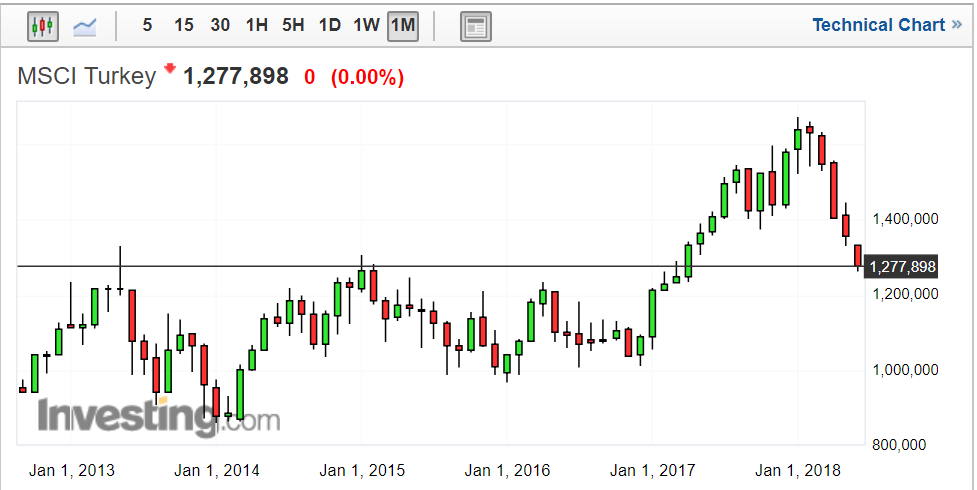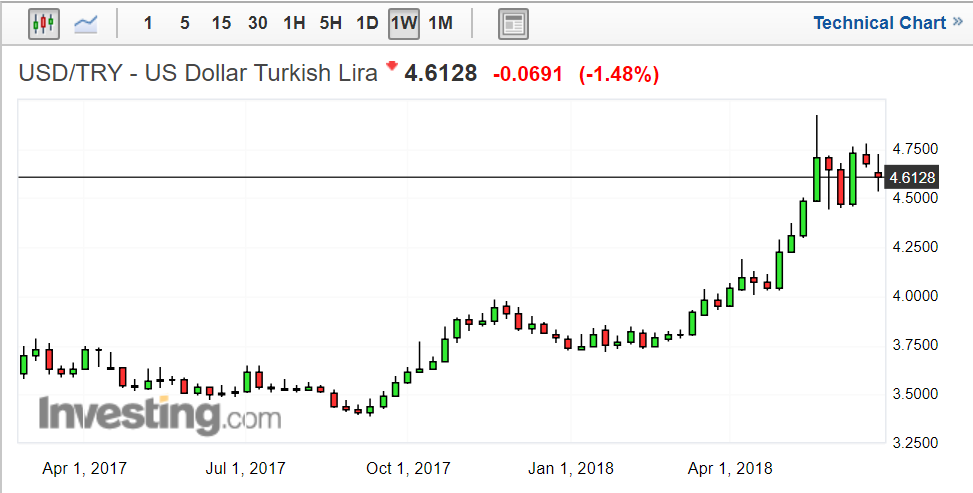Investing.com’s stocks of the week
Summary
Turkey is in the US crosshairs over its plan to buy Russian S-400s.
The lira crisis has many echoes of the ruble crises of 2014-15.
Turkey's suitors geopolitically could assist it in defying the US.
Investors should consider the opportunity to buy the bottom on Turkish equities.
This idea was discussed in more depth with members of my private investing community, Stocks, Shocks & Rocks.
Sputnik is reporting that the US is threatening newly re-elected Turkish President Recep Tayyip Erdogan with financial sanctions if Turkey goes through with their planned purchase of Russian S-400 missile defense systems.
This comes directly on the heels of Erdogan’s victory in this weekend’s elections.
The Turkish lira has been a textbook example in recent months of what happens to a currency when its debt position is vulnerable to a rising US Dollar Index Futures (UUP). The USD/TRY has collapsed while the Bank of Turkey raises interest rates to staunch the flow of dollars out of the country.
The problem is that Turkish corporates owe more than $220 billion to investors payable in US dollars. While the Turkish government’s position is stable with reserves more than covering the country’s sovereign debt, it is this dollar-denominated corporate debt that is the catalyst for the dramatic drop in the lira’s exchange rate these past few months.
Now, in my opinion, nothing moves this far without a little help. And Turkey’s openly defying the Trump administration on cutting off trade with Iran hasn’t helped their situation at all. Trump is committed to isolating Iran from financial markets once the grace period ends in November, per his removing the US from the JCPOA.
It is Trump’s policy that he wants all US allies, presumably Turkey since they are still in NATO for the time being, to drop buying any oil from Iran. While at the same time calling for OPEC to open up the taps, knowing full well without external investment Iran cannot do so, but Saudi Arabia can.
There will be no exception waivers granted this time.
Coincidentally, as Bloomberg broke the news about the imminent Saudi boost, a State Department official said that the US is pushing allies to cut oil imports from Iran to zero by Nov. 4, adding that the US isn’t granting waivers on Iranian oil imports ban.
The threat of sanctions now over their buying S-400’s from Russia only adds to the potential misery for Turkish businesses in the coming months.
So, this looks like a dire set of circumstances that will continue forever, right?
Wrong.
Nothing moves in a straight line and the market is the ultimate discounting mechanism based on the fear of the future. Currency and bond market pressure on Turkey reached a fever pitch a few weeks ago as the initial scramble for dollars after Trump’s departure from the JCPOA sparked a panic domestically for dollars.
But, despite the persistent stream of bad news, the lira hasn’t come close to challenging its high in May and that tells me the worst of the crisis may be past. The longer the lira goes without pushing higher, the more likely that high will form the peak of this bear market.
With two-year Turkish debt yielding 16+% how much worse do you really think things could get for a country whose biggest problem is not its economy but its relationship politically with the world’s most powerful country?
And if Trump is serious about sanctioning Turkey, cutting them off from doing business in dollars, the situation could still deteriorate.
The Russia Model
It will be akin to the short-term funding crisis Russia (RSX) went through in late 2014-15, where low oil prices and sanctions made it impossible for Russian corporates to roll over their maturing dollar-denominated debt.
This is the same squeeze play Trump is putting on Turkey now. And the market is selling Turkish assets in anticipation of this.
Russia survived this by paying off the debt and swapping it into rubles. Turkey has already begun doing precisely that, except in lira. It’s a pittance versus what is out there. But, then again, not all the dollar obligations of Turkish companies will mature at the same time.
It took Russia more than two years to retire its dollar-denominated corporate debt. It will likely take Turkey that long or longer. But, today, there is little worry over the dollar/ruble exchange rate destabilizing the Russian economy because there are few external dollar obligations left which could cause a short-term funding crisis.
The last was in April with the imposition of sanctions against Russian aluminum producer Rusal and as I pointed out in a blog post earlier this month, the problem for Rusal wasn’t dollar-denominated debt, but its accounts receivable since so much of its business was conducted in dollars.
That dust up caused the Russians to dump half of their US Treasury debt onto the market as a warning to the US of where this fight goes if necessary.
Looking Ahead
There are two more angles to the Turkish story I want you to consider.
The first is the NATO Summit on July 11-12th. Erdogan is invited. He and Trump have agreed recently for the Turkish army to consolidate its position in northern Syria. This, to me, means that the US is not ready to jettison Turkey from NATO yet and is still willing to deal geopolitically with Erdogan to keep him from turning his back on the West completely.
This gives Erdogan a lot of leverage, which he has played very well over the past couple of years, in negotiations with Trump over Turkey’s access to the dollar.
It is no secret that Erdogan and Turkish banks were the conduit for Iran to sell its oil on the market during the last round of sanctions, using gold (GLD) as the intermediary for the accounting.
And Erdogan has pledged to continue doing business with Iran after the sanctions curtain falls again. So, this looks like an impasse, and it likely is.
Turkey being a net energy importer will, I think, coordinate with Iran to buy their oil in Chinese yuan (CYB) on the Shanghai exchange. Turkey runs a big trade deficit with China, as China is the biggest exporter into Turkey ($23.4 billion, 11% of the total) that can be a major source of dollars and/or yuan if necessary.
And that means there’s a wide-open path to ensure the flow of dollars into Turkey.
This serves a number of purposes.
It keeps the demand for Iranian oil high even as it loses customers in Japan and South Korea. It assists the central bank in swapping out the dollar-denominated debt into local currency or yuan, similar to how China supported Russia in 2015. It ultimately erodes the ability of the US to cut countries out of the world economy, and empowers the yuan as a broader trade-settlement currency for Asia.
The Conclusion
I would be watching Turkey very carefully over the next few weeks. If Erdogan and Trump don’t see eye-to-eye at the NATO Summit there could be some more downside risk as the market sells the news.
But, given what I’ve outlined here, there is a path for Turkey to survive the wrath of the US which ultimately changes the entire geopolitical map. For that reason, Turkey could stare down Trump on sanctions risk and force a settlement in its favor.
The result would be an immediately relief rally in both the Turkish lira and Turkish equities, which have corrected sharply this year. The Dow Jones Turkey Titans 20 Index is down over 18% this year as is the MSCI Turkey Index.
The latter has corrected back to long-term support between 1200 and 1275.

In situations like this, US investors get the opportunity of a geopolitical ‘two-fer’ in that both the currency and the equity markets have been thrashed. The dollar value of Turkish equities is now very attractive trading at a nine-year low. A relief rally in the lira sets up a dead-cat bounce of 15-20% for the MSCI Turkey ETF (TUR) on the currency effects alone.
The essence of being a contrarian investor is knowing when the worst is here, and then going where no one else is willing to go. TUR is paying a 12-month yield of 3.5%.
The risks are still there that Erdogan will have to implement capital controls to stop the outflow of dollars and that Trump could go nuclear on anyone who refuses to cut off trade with Iran by forcing them out of the SWIFT electronic payment system.
But, those fears are overblown as Turkey is too important geostrategically to handle in that manner alone, without far bigger threats. Besides, Turkey was part of the coalition that helped Iran weather the same kind of storm.
Disclosure: I/we have no positions in any stocks mentioned, and no plans to initiate any positions within the next 72 hours.
I wrote this article myself, and it expresses my own opinions. I am not receiving compensation for it (other than from Seeking Alpha). I have no business relationship with any company whose stock is mentioned in this article.

